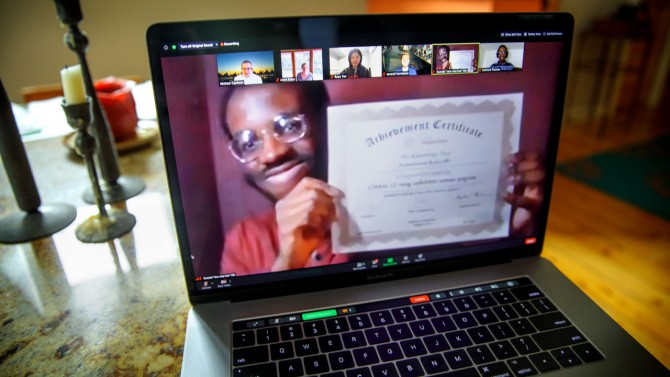$3.3M gift to support CIS diversity efforts
By Melanie Lefkowitz
A $3.3 million gift from the Hopper-Dean Foundation will fund the creation of an Office of Diversity and Inclusion in the Faculty of Computing and Information Science (CIS), in addition to new graduate student fellowships and increased support for existing programs that foster diversity in computing.
“I’m very grateful for the incredible opportunity to pursue important initiatives in CIS that improve diversity, inclusion and equity in our student body. Our faculty and staff are deeply committed to these initiatives, and now we will be able to scale up our programs in a sustainable way,” said Kavita Bala, dean of CIS. “This gift is very timely in helping us work towards addressing the inequity we see in the world. This is going to have a tremendous impact on our students.”
With the three-year grant, a director and staff will be hired to oversee CIS’s diversity and inclusion efforts, which include all-expenses-paid summer programs for students from underrepresented backgrounds, support for student initiatives and funding to attend conferences aimed at boosting diversity.
The Hopper-Dean Foundation – led by philanthropists Jeff Dean, lead of artificial intelligence at Google, and his wife, Heidi Hopper – has supported other CIS programs, including CSMore, a new summer workshop for rising sophomores, which was developed after faculty noticed disproportionate numbers of underrepresented minorities interested in computer science were choosing different majors in their second year. The foundation also helped launch Black in AI, co-founded at Cornell by Rediet Abebe, M.S. ’18, Ph.D. ’19.
“We’re impressed by the forward-looking ways that Cornell has been approaching diversity in computer science in the last few years, and look forward to continued work in this area,” Dean said.
The new grant will include long-term support for CSMore, in addition to other summer programs such as the 10-year-old SoNIC workshop in cloud computing, which aims to encourage students from diverse backgrounds to pursue careers in academia.
“Every year it’s a scramble to get the funds,” said Phoebe Sengers, associate professor of information science and director of broadening participation in information science. “So far we’ve always managed to make it work, but having this funding will mean we can pour more into the intellectual and academic parts of the programs, rather than the administrative and fundraising parts. It’s going to allow us to push much further than we would have been able to otherwise.”
The funding will pay for up to five additional students who have expressed interest in computer science to participate in Cornell’s Pre-Freshman Summer Program, which helps prepare students from disadvantaged high schools and backgrounds for Cornell. It also will allow CIS to boost its support of student programs such as Underrepresented Minorities in Computing at Cornell (URMC).
The new Hopper-Dean Scholars Program, supported through the grant and by Cornell, will fully fund five doctoral students from underrepresented backgrounds in their first year at CIS.
“Having an Office of Diversity and Inclusion allows us to have people run and organize these programs, which will make the faculty efforts more effective,” said Éva Tardos, chair and the Jacob Gould Schurman Professor of Computer Science, and outgoing CIS associate dean of diversity and inclusion. “This gift is a wonderful vote of confidence that we have been doing a lot of work on diversity, and having some success.”
The new office will work in partnership with Diversity Programs in Engineering in the College of Engineering, Tardos said.
Increasing diversity in computing, a nationwide challenge, is a longstanding priority for CIS, where in spring 2020 underrepresented minorities comprised 16% of undergraduate majors (compared with 5% in 2008) and 7% of doctoral students (3% in 2008). Nationally, 10.8% of computer science bachelor’s degrees are awarded to underrepresented minorities, according to the Computing Research Association’s 2019 Taulbee Survey.
To combat these inequities, Cornell’s efforts are aimed at improving representation throughout students’ education and careers, from outreach to high school students to attracting and supporting diverse faculty. Cornell is also a partner in the FLIP Alliance (Diversifying Future Leadership in the Professoriate).
“CSMore reaches students at a critical point; the pre-freshman program reaches students at a critical point, as does the first year of the Ph.D. program. They’re all critical points, but they’re all very different as well,” said Hakim Weatherspoon, associate professor of computer science and interim associate dean for diversity and inclusion. “I’m excited that this funding provides some extra teeth to our commitment to these programs.”
Media Contact
Get Cornell news delivered right to your inbox.
Subscribe

